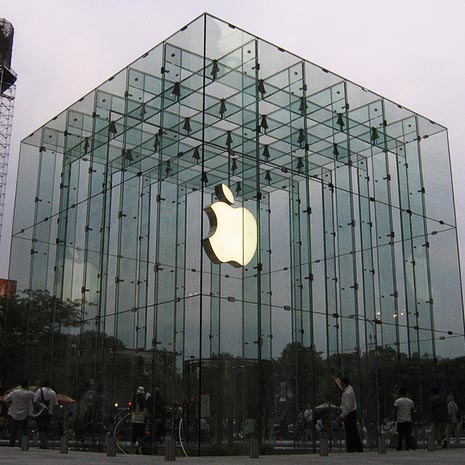WE CRADLE them in our palms, to listen to music. We cup them to our ears, to converse with people far away. We nestle with them in bed, for entertainment. You may even have one in your lap to read this article. These gadgets seem ubiquitous, and many were either made by Apple or borrowed from them.
The reaction to the death of Steve Jobs, the co-founder of Apple, was like a flood: swift and overwhelming. Within hours, gigabytes of commentary and tributes were flashing around the world. The ABC even set up an online obituary – a webmento mori with ten sub-sites. It was not an obituary in the traditional sense of a sober reflection on Jobs’s personal and work history. Rather, according to the tenor of the times, it was an interactive multimedia site with “infographics,” “inspirational” video and a tributes page.
Much of the hagiography has been boilerplate. Prime Minister Gillard intoned that “all of us would be touched by products that he was the creative genius behind, so this is very sad news and my condolences go to his family and friends.” A little has been raving. Retailer Gerry Harvey compared Jobs, in a single sentence, to Einstein, Atilla the Hun, Alexander the Great and Moses. Some has come from rivals and colleagues searching for a personal tone, but unable to avoid boosterism for their industry. Bill Gates said that “the world rarely sees someone who has the profound impact Steve has had, the effects of which will be felt for many generations.”
But the bulk of the tributes have spilt from the mouths and fingers of everyday folk. Like the fan – one of the many who spontaneously gathered outside Apple stores – who lamented that “it feels like the end of the innovators.” Jobs’s death has instantly transformed him from a real person, who spent his adult life helping design and sell gadgets, into the emblematic hero du jour: a “genius entrepreneur.” What sense, if any, can we make of this? What does it tell us about the centrality of electronic devices to an age richer in communication than reflection? And what does it reveal about the human need to mythologise, even in a time of supposedly rational markets, technologised science and information exchange?
There are two easy explanations, though each is too easy to withstand scrutiny. One is that people, especially those of us living comfortably, are easily arrested by premature death. Material success and fame are the allures of a secular market economy, to the point that we forget they cannot guarantee a long and peaceful life rather than one ended painfully in its prime. Yet Jobs’s demise was hardly unexpected. He had endured pancreatic cancer for some years, and recently relinquished his position as chief executive in recognition of the irresistibility of the disease.
Another facile explanation is that the adulation of Jobs is an essentially American phenomenon, albeit one rubbing off on the wider West. The United States, as its politics reveals, is in the thrall of individualism, and the image of the single, almost Olympian, entrepreneur or inventor is one manifestation. But Jobs was not a mere celebrity, celebrated for being celebrated. He was truly at the forefront of an industry that has altered, irrevocably, the way many people communicate, and transformed our idea of the media.
Jobs was at the forefront of this development because the influence of Apple was disproportionate to the numbers of devices it sold. Leaving aside its original raison d’être, the Mac computer (which remains a distant second fiddle to the standard PC) Apple has sold only around 30 million iPads and 130 million iPhones, although its 300 million iPods have formed a quasi-monopoly. These are big numbers for devices that are not bottom of the range. But they have not changed the world; rather, they have enhanced the lives of some people (mostly the under fifties) within one class (the middle class) in some regions of the world (the industrialised rather than developing nations).
Those numbers do go some way to explain another big number. Apple’s shares recently exceeded US$350 each, so that it rivals Exxon as the most highly valued corporation in the world. Its real value, however, lies in its brand, resurrected in the 2000s and now standing at the intersection of good design and cool. Apple is mainstream hip. Jobs deserves the lion’s share of the credit for that marketing transformation.
We don’t normally lionise the people who are the best marketers. We could adapt the old saying about propaganda: “Fool me once, shame on you; fool me twice, shame on me.” Sell me a gadget once, that’s the market; sell me that gadget twice and I’m hooked and you’re rich. The digital world is a disposable world, with some owners upgrading their mobile devices annually. The iPhone, Apple’s signature product, has been through four “generations” in barely as many years. Many of those 300 million iPods were sold to folk like “SamCostello,” who went through seven of them.
Despite its hip badge and wholesome, fruity logo, Apple is one of the more controlling corporations in the field, a fact that increasingly riles not just smaller innovators, but also former acolytes who fret that the promise of the internet as a communal environment is being lost. Mega-businesses such as Apple and Facebook seek to monopolise content and access, to compartmentalise and monetise what began as an open and free space.
Less well acknowledged is the exploitation – not just by Apple but by the wider industry - of Asian, especially Chinese, labour. This problem is not complex and it is well understood. But it confronts us with the uncomfortable realisation that the toys facilitating our entertainment and productivity, and Apple’s inflated profits, are the product of working conditions that we would never endure, as well as designs that we cherish.
Jobs created nothing genuinely transformative. He did not invent the internet: that was done by relatively unhailed researchers in US universities and its defence force. Nor did he lay out the essential fabric of the web, as Tim Berners-Lee and Robert Caillau did at CERN, in France, in 1990. Now knighted, Berners-Lee has also been elected to the American Academy of Arts and Sciences, but he is no household name compared to Silicon Valley moguls such as Gates, Zuckerberg and Jobs.
What Jobs did do was build a vast company around principles of good design, both in hardware and appearance and, more importantly, in software and usability. The term “entrepreneur” is often misused. Recall George W. Bush allegedly claiming that “the French have no word for entrepreneur”? Besides the etymological irony, Bush seems to have wrongly imagined entrepreneurship to mean “risk-taking.” This common mistake is a conceit of individualistic capitalism. As Malcolm Gladwell wrote recently in the New Yorker, the successful entrepreneur is less a grand risk-taker than a methodical organiser and leader. She is someone who adroitly refines existing inventions and processes, packaging them cleverly in ways that fit or create a market. Apple and Jobs were more creative and less predatory than the examples Gladwell gives, but the description still fits. As lawsuits reveal, others seek to piggyback similarly on Apple.
Ultimately, Jobs was the human face of the often-dehumanised world of computer science and consumer electronics. People realise that gadgets like smartphones have transformed aspects of their lives, for both better and worse. Their insistent buzz intrudes on relationships and the experiences of the moment. They appeal to our banal desire to broadcast ourselves as much as they bring us together. But most who enjoy them forgive their addictiveness and cannot remember a life without them. Others find intimacy in their gadgets: in the simple physical presence of devices that engender a sense of ever-connectedness. It is these people who have led the rush to immortalise Jobs, because they want to thank someone for the gift of technology. Label this a “cult of personality,” as Mark Cohen did in The Drum, and see how personally offence is taken.
Though they may be distracting us to the point of decentring us, these gadgets are not transforming humanity in any fundamental sense. We still live by rituals and stories. The act of plugging into or checking these devices is so ingrained into the routines of millions that it has become an unconscious ritual. And chief among the stories we live by are myths, notably the myth of the great man, whose individual drive and genius changes the world. It is easier to pay homage to and heroicise Steve Jobs than to make sense of, let alone give thanks for, something as complex as the world of patents, geeks and corporate mergers that make up the computing revolution. •




